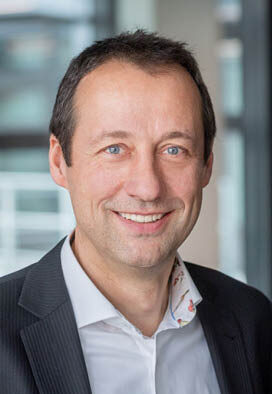
What fascinates you about the Munich Innovation Powerhouse?
What key challenge do you see for the future of mobility in general?
What perspective or expertise do you bring to MCube, which project are you leading or which topic do you exemplify?
"For me, MCube means..."
Markus researches and teaches in the following areas: Electromobility with the aim of creating new vehicle concepts, driver assistance systems up to automated driving as well as mobility data and mobility concepts. He is the scientific director of the Munich School of Engineering, the Electromobility Science Center and the CREATE project in Singapore.
Seinem Maschinenbaustudium an der TU Darmstadt und Cornell University folgte die Promotion an der TU Darmstadt (1995). Nach einem internationalen Traineeprogramm bei Volkswagen und einem Aufenthalt im damaligen Joint Venture zwischen Ford und Volkswagen in Portugal leitete er den Bremsenversuch in der Nutzfahrzeugentwicklung in Wolfsburg. Später war er Hauptabteilungsleiter für die Forschung „Elektronik und Fahrzeug“ in der Konzernforschung der Volkswagen AG. Einen Schwerpunkt bildeten Fahrzeugkonzepte für die Elektromobilität. Seit November 2009 lehrt er am Lehrstuhl für Fahrzeugtechnik der TUM und leitet seit Oktober 2010 den Lehrstuhl als Nachfolger von Prof. Dr. Ing. Bernd Heißing. Markus ist zudem Vorstandsmitglied der VDI Fachgesellschaft Fahrzeug- und Verkehrstechnik.
The project investigates how various car-sharing models at residential locations can offer an attractive alternative to the little-used private car.
DatSim ensured the synergistic bundling of mobility data in the cluster, supported the evaluation of measures and enabled the simulation of relevant scenarios.
We have tested an innovative car-sharing model with electric vehicles in a real-world laboratory. The special feature: Only a closed circle of neighbors shared the cars.
With the Wiesn Shuttle project, we have proven that autonomous driving is already possible in complex, urban environments.
No results available
The project investigates how various car-sharing models at residential locations can offer an attractive alternative to the little-used private car.
We are creating a digital basis for comprehensively mapping mobility in the metropolitan region and testing the effectiveness and safety of future measures before they are introduced.
DatSim ensured the synergistic bundling of mobility data in the cluster, supported the evaluation of measures and enabled the simulation of relevant scenarios.
We have tested an innovative car-sharing model with electric vehicles in a real-world laboratory. The special feature: Only a closed circle of neighbors shared the cars.
With the Wiesn Shuttle project, we have proven that autonomous driving is already possible in complex, urban environments.
No results available
What is MOSAIQ?
Imagine something: There is more space for people. The streets have more trees and plants. Everyone can get around better. That's how your Schwabing-West district could be in the future. How would you like your district to be? We want to talk to you about it!
The project is called MOSAIQ. MOSAIQ is a research∙project. MOSAIQ means: Mobility and urban climate in the future city∙part. The Technical University of Munich is leading the project.
What is MOSAIQ about?
MOSAIQ wants to make the streets in the city∙part more beautiful. People should feel comfortable there. There should be more space. For meetings and plants, for example. You can help decide what is tried out in the Stadt∙teil. The ideas come from you. Some ideas will be tried out on the streets for a certain period of time.
The aim of MOSAIQ is to make urban districts good places to live.
At the same time, the climate in the city should improve. And people should be able to move around the city easily.
What is happening in the district?